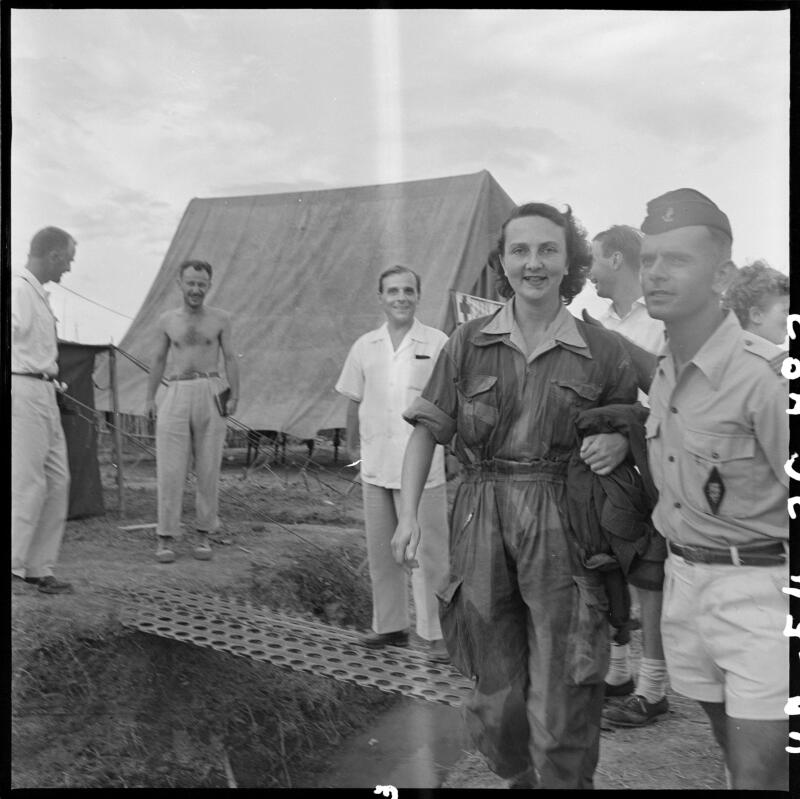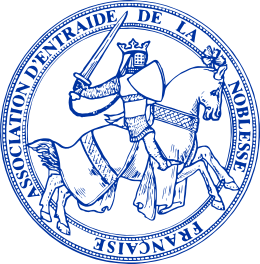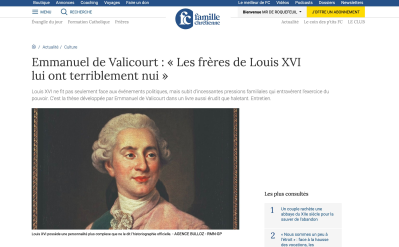News

Le Monde : "Geneviève de Galard, "the angel of Dien Bien Phu", is dead".
This staunch Catholic was an air transport nurse in the hell of the Indochina war. Adulated at the end of the conflict for her courage and self-sacrifice, then gradually forgotten, Geneviève de Galard passed away at the age of 99.

Geneviève de Galard is received by the medical officer in charge of the surgical unit in Luang Prabang, Laos, on May 24, 1954.
In 1954, at Dien Bien Phu, during the sixty-odd days Geneviève de Galard spent on the battlefield, the wounded by bullets or shrapnel, the mutilated, the blind, the badly burned, and all the French army soldiers trapped by the Vietminh in the cuvette, all the tough guys from the parachute regiments, the Foreign Legion or the colonial troops, called the nurse successively "Mademoiselle", "Mam'zelle", then "Geneviève". When they weren't shouting "Maman" in their delirium of agony. For posterity, or at least for history, the woman who died on Thursday May 30, aged 99, has forever become "the angel of Dien Bien Phu".
" During the worst hours of the Indochina war, Geneviève de Galard showed exemplary devotion to the courage and suffering of 15,000 French soldiers. I salute her memory ", reacted Emmanuel Macron on Friday.
Her courage in the midst of the chaos and under the deluge of shells was highlighted as a balm to a defeat that consummated the loss of Indochina and, beyond that, the beginning of the end of the French Empire. The nurse found herself heroized against her will and against her nature. "I don't deserve this honor, because I've only done my duty", she kept repeating. In the end, her genuine modesty added to the illumination, as did her eternal self-conscious smile.
A photo of her, a little lady floating in her parachute suit, sleeves rolled up, taken on May 24 as she got off the plane in Luang Prabang, in what is now Laos, just after her liberation, and published on the cover of Paris Match, completed the popular icon's status. Her round face, prominent cheekbones, thin lips and blue eyes became the symbol of the epic in which a lamentable strategic error on the part of the general staff had been sugar-coated. Geneviève de Galard was not fooled by the role she was being made to play. For a long time, I kept quiet," she wrote in her belated memoirs (Une femme à Dien Bien Phu, Les Arènes, 2003). I didn't want to feed the publicity I had received in 1954. It had seemed exaggerated, and sometimes misplaced, at a time when my fellow prisoners were still suffering in the camps. "
" God will protect me
Geneviève de Galard Terraube, her full surname, was born in Paris on April 13, 1925. She came from a wealthy family with a strong sense of patriotism, claiming noble titles dating back to Joan of Arc and even the Crusades. Her father died when she was 9. Her mother brought her up in the values of the Catholic right. The Christian faith never left her, and became even more deeply rooted in her at the worst times. " God will protect me! she convinced herself at Dien Bien Phu, as she ran from trench to trench under the shells.
The young girl lived between the capital and her family's property at Labatut, in the Landes region. During the war, she took refuge in Toulouse, before returning to Paris in November 1942 after the Germans invaded the unoccupied zone. The young girl grew up reading adventure and travel books. After passing her baccalaureate, she began studying English at the Sorbonne. Looking for a profession, a vocation, a future, she found it in 1950: she passed her nursing diploma. Two years later, she passed the competitive examination for the convoyeuses de l'air, the flying nurses responsible for assisting the wounded and sick evacuated by plane. Attached to the Lanessan hospital in Hanoi, she discovered Indochina in 1953. The Vietnam War of Independence, which had broken out in 1946, was raging. Geneviève de Galard convoyed the wounded under fire, performing life-sustaining gestures in the vibrating cabin, supervising infusions, sometimes feeling the men leave despite her efforts to hold them back. After a stay in Algeria, she returned to the Far East in February 1954.
In November 1953, the French army set up a fortified point in the Dien Bien Phu basin, which was soon to be encircled by General Giap's soldiers, in a bid to keep the Vietminh troops at bay. Along with a dozen other convoy women, Geneviève de Galard carried out a few daytime missions on the spot, without any problems. " The entrenched camp already looked completely bare to me: from the air, it was a world of guts, trenches and shelters ", she described. she described. But on March 13, Giap launched his offensive. With the airstrip under direct cannon fire, it was soon necessary to land at night by the light of three lanterns indicating the start and end of the runway, load the wounded and take off again for Hanoi. On March 28, the landing was particularly acrobatic. The plane skidded and a barbed-wire spike pierced its oil tank. At dawn, enemy artillery destroyed the Dakota. Over the next two days, other planes tried to land, but to no avail, given the intense gunfire. By March 30, it was clear that the runway had become impassable. Geneviève de Galard was stranded at Dien Bien Phu, along with the entire garrison.
In a chapter of his memoirs (j'étais médecin à Dien Bien Phu, 1954, Éditions France Empire), Grauwin paints the portrait of a Madonna who ended up commanding respect in this masculine and even macho world. " As the shells fell, I looked at her and was astonished by her calm. She went from wounded to wounded as if nothing had happened. She had the right gestures, the gentleness, the precision, the words we were waiting for in her pure, fresh young girl's voice." He depicts her helping the wounded to eat and drink, the maimed to smoke their cigarettes. " Here's another shot. Did it hurt? "
The conveyor girl swaps her navy-blue suit and patent leather shoes for a paratrooper's outfit, stitched at the waist with surgical thread, and a sturdy pair of Pataugas. The men manage to give her a little privacy in these crowded spaces. Her solicitude and patience won her the soldiers' adulation. " At Dien Bien Phu, I was a bit like a mother, a bit like a sister, a bit like a friend ", Geneviève de Galard recalls. " My presence alone, because I'm a woman, seems to make this hell a little less inhuman ", she continues. A soldier with both arms and one leg amputated promises to take her dancing when all this is over. With the monsoon, we have to wade through the mud, between the stretchers laid on the ground. Affected by anthrax, the nurse is in turn operated on without anaesthetic.
In Hanoi, the press began to spin the legend of this character. She was presented as " the only woman in Dien Bien Phu ". This hypocritically overlooked the companions of the auxiliary troops and the prostitutes in the two military brothels set up in the camp. On April 29 1954, Geneviève de Galard was awarded the Légion d'honneur. For her bravery and dedication, the French Foreign Legion made her an " honorary legionnaire de première classe ", along with Colonel Marcel Bigeard. An honor far rarer than a rosette, it reflects the esteem in which she is held by the troops.
On May 7, defeat was complete. The cannonade ceased. The camp was definitively taken over by "bodoï" (soldiers from regular Vietminh units). While the first prisoners left on foot for re-education camps, where many would perish, Geneviève de Galard continued to care for the wounded who had remained behind. In exchange for the promise that some of them would be released, she wrote a letter to Ho Chi Minh on his birthday, May 19: " I wish to express my thanks to you, Mr. President, for your attitude of clemency towards the wounded prisoners of Dien Bien Phu whom you are willing to release. My wishes for you, Mr. President, are wishes for peace. The letter was picked up by Vietminh propaganda, which irritated this visceral anti-communist to no end.
Geneviève de Galard's release is announced on May 21. She postponed her departure to continue caring for the wounded. She finally left Dien Bien Phu on May 24. " I don't know if you've realized that the eyes of the whole world are on you ", she warned on the plane. a companion warned her on the plane home. After the stopover in Luang Prabang, she discovered her fame when she landed in Hanoi, where she was besieged by the international press. On June 1, a dense crowd applauded her at Orly.
Guardian of a memory
Geneviève de Galard finds herself on display, her panache masking the inevitable questions raised by the bitter failure of Dien Bien Phu. On July 21, just as the Geneva Accords establishing the partition of Vietnam and the mourning of French claims to Indochina had been ratified, Geneviève de Galard embarked on a major tour of the United States. The aim was to make people forget their soft support for France, and to prepare them for the idea that France would have to take over from France in the face of Communist expansionism.
On the 26th, the nurse paraded down Broadway and Fifth Avenue in New York, wearing a white uniform and driving an open-topped black Cadillac, under a shower of confetti. In Washington, she was invited by Congress. President Eisenhower decorated her at the White House. This was followed by a triumphant tour of America's major cities, with crowds and cocktails in evening dress. Hollywood offered her a golden bridge to adapt her story for the screen. She refused, just as she had refused money from the newspapers that wanted to publish her memoirs exclusively. While she was basking in the glow of honors, she was constantly reminded of the fate of her fellow prisoners, whom France seems to have forgotten.
" I feel that in my existence there is a before and an after to Dien Bien Phu ", Geneviève de Galard can only say. She resumed her job as a conveyor belt driver in Saigon in November 1954, then left the army in July 1955, before entering the Invalides rehabilitation center. The following year, she married a soldier, Jean de Heaulme, the union being heralded as a social event by all the press, Le Monde being no exception (the couple had three children). Geneviève followed her husband on his postings, notably to Madagascar, which had just gained independence. Back in France, Geneviève de Galard took care of the boat people fleeing Communist Vietnam. In 1983, Geneviève de Galard was elected city councillor for the 17th arrondissement of Paris, a position she held for 18 years.
Geneviève de Galard was gradually forgotten, due to her discretion and France's guilty conscience towards a war that history has deemed imperialist. But she kept in touch with the veterans of Dien Bien Phu for the rest of her life, and was inundated with letters from survivors expressing their gratitude. " You were for me, in this hell, the image of Christian charity ", wrote one of these former soldiers, writer and film-maker Pierre Schoendoerffer. In 1984, she protested against a documentary by Henri de Turenne which, in her opinion, made too much use of Vietnamese propaganda images and re-enacted scenes with French prisoners. In 2001, Geneviève de Galard returned to Vietnam. But she refused to go to Dien Bien Phu.
Read the article on www.lemonde.fr
By
Published May 31, 2024









